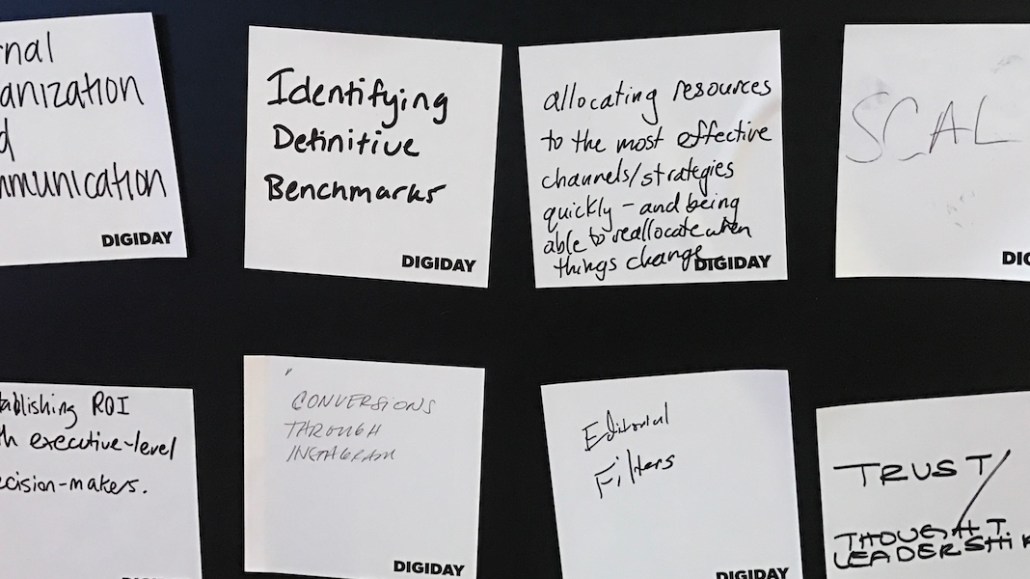Secure your place at the Digiday Media Buying Summit in Nashville, March 2-4
‘Do butt clicks count?’: Content marketers sound off on Facebook and ROI

This week, we gathered together brand managers, editorial directors and social media strategists from brands in Vail, Colorado, for the Digiday Content Marketing Summit. Along with hearing from speakers from brands like Reebok, IBM and Heineken, attendees put their heads together in group meetings to discuss solutions to their biggest challenges in different areas of the business: ROI, platforms and the question of in-house marketing versus agency partnerships.
During the group sessions, we plucked some of the best one-liners to shed light on what’s on the minds of content marketers today.
Facebook: Friend or foe?
“Is your Facebook rep there to help you out and do what’s best for your brand, or do they just want to make sales and meet a quota? It’s impossible to know — but you have to assume they’re at least somewhat self-serving.”
“When we look at platform-provided metrics and then compare them with our own or our partner’s, there’s always a discrepancy. It’s not a Facebook-only thing; I see it with Twitter, too. LinkedIn is almost totally obtuse. Knowing what data to believe is the biggest challenge we have.”
“As long as [Facebook’s] data is consistently wrong, I don’t care. If you’re wrong by the same factor, I can live with that.”
“Whenever you push back on analytics, [Facebook reps] will say it’s directional, it’s the algorithm, etc. The thing that has helped us is not an adversarial relationship exactly, but one where they expect us to call them out. It benefits us more when we push back because it’s frustrating when you make a change based on their advice and direction, and then nothing happens.”
“There’s a long lead time. Just because we put up a great Facebook video, it’s not that someone says, ‘Oh, I’ll go buy.’ There’s a lot more involved in that.”
Going mobile-first
“If I pay to get my mobile content up and then it takes 10 seconds to get the page to load, I’ve paid to do nothing because the audience abandoned me seven seconds ago. I don’t want to pay for someone who bounced.”
“My biggest question around mobile ROI is: Do butt clicks count?”
“I think it’s good Facebook is optimizing mobile-first, but how does that help the little guy who’s trying to get up to speed? A lot of times, it’s just me writing the metadata myself.”
The indirect sell
“Content marketing is not a nice-to-have; it’s a must-have, but it costs money. Where is that money supposed to come from? A sale makes it easier to justify, but you can’t always be selling. That’s a huge turnoff.”
“The purpose of our newsletter is to generate revenue. But the content is not necessarily about selling at all; it’s about a lifestyle. So figuring out how to keep people interested when they do see ads that they’re not used to seeing is a big battle for us.”
“‘Ads’ is a dirty word. We say ‘content marketing’ because we don’t want to scare off the customer.”
“When you’re selling a product, and you’re not editorial, but you’re trying to create content people actually want to read, we fear that people are going to immediately bounce the second they realize they’re reading sponsored content or brand content.”
“Is anything TMI? We always wonder: What would drive customers away? Being too sales-y, too overt, is always what will do it.”
The agency problem
“Can an agency own a brand the same way the people who eat, breathe and sleep the brand every day can? No.”
“I want meaningful creative that’s going to make a difference for the customer. Sometimes, agencies are too focused on the ‘cool shit.’ A little cool shit once in awhile is OK, but at the end of the day, we need business results, not one-hit wonders.”
“Can an agency be as involved in the brand as you would be as the brand owner? They can be, but you have to treat them as if they are. Some people hold them at arm’s length.”
Internal struggles of in-house
“Disasters can happen when you bring your work in house — some stories are better told from a state of objectivity; otherwise, you’re working in an echo chamber. Look at Pepsi.”
“Agencies are great at finding talent and retaining it. In-house groups are going to struggle with that. How do you keep creative people happy within the confines of a corporate brand?”
“A lot of times, the goal of converting sales is at odds with the talents of a creative team. That’s a big burden for them.”
Influencer gripes
“It truly only works when [the influencers] actually like your product. We’ve paid influencers to post about us who clearly didn’t use the product once but still made a video about it, and it was so awkward.”
“You need to make relationships before throwing money. Better yet, use product instead of money as currency. If they like it, they’ll spread the word.”
“A lot of time you have to go through an agency, and the agency doesn’t want you building a direct relationship with the influencer directly because that cuts them out. They want to keep that control.”
More in Marketing

Pitch deck: Why Amazon believes its premium streaming inventory is worth the money
Amazon is pitching its DSP to make the case.

In Graphic Detail: The state of the marketing agency sector
Revenue figures from Omnicom, Publicis and Havas, and new employment stats, offer a snapshot on a quickly evolving industry.

Future of Marketing Briefing: The mental gymnastics of principal media
Welcome to the psychological CrossFit class of modern marketing. Here’s how marketers are learning to move through it.








